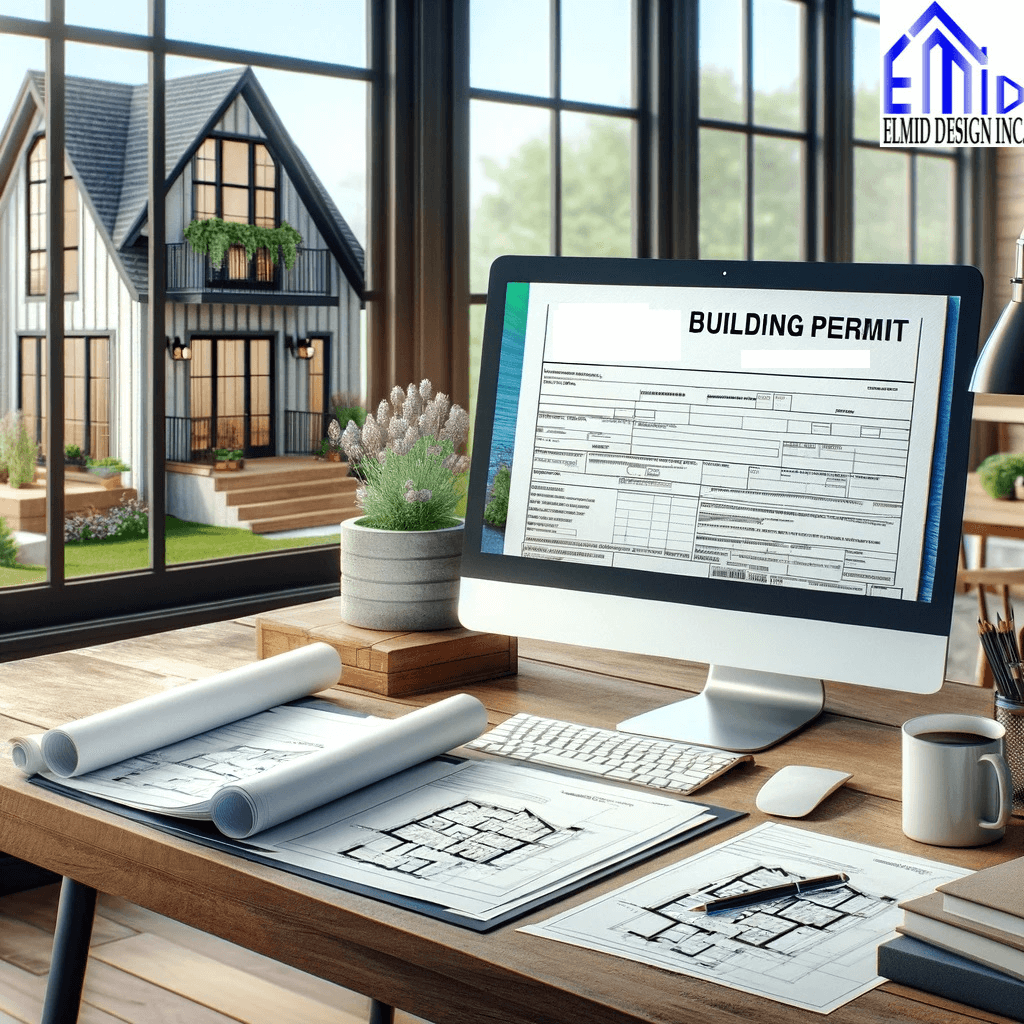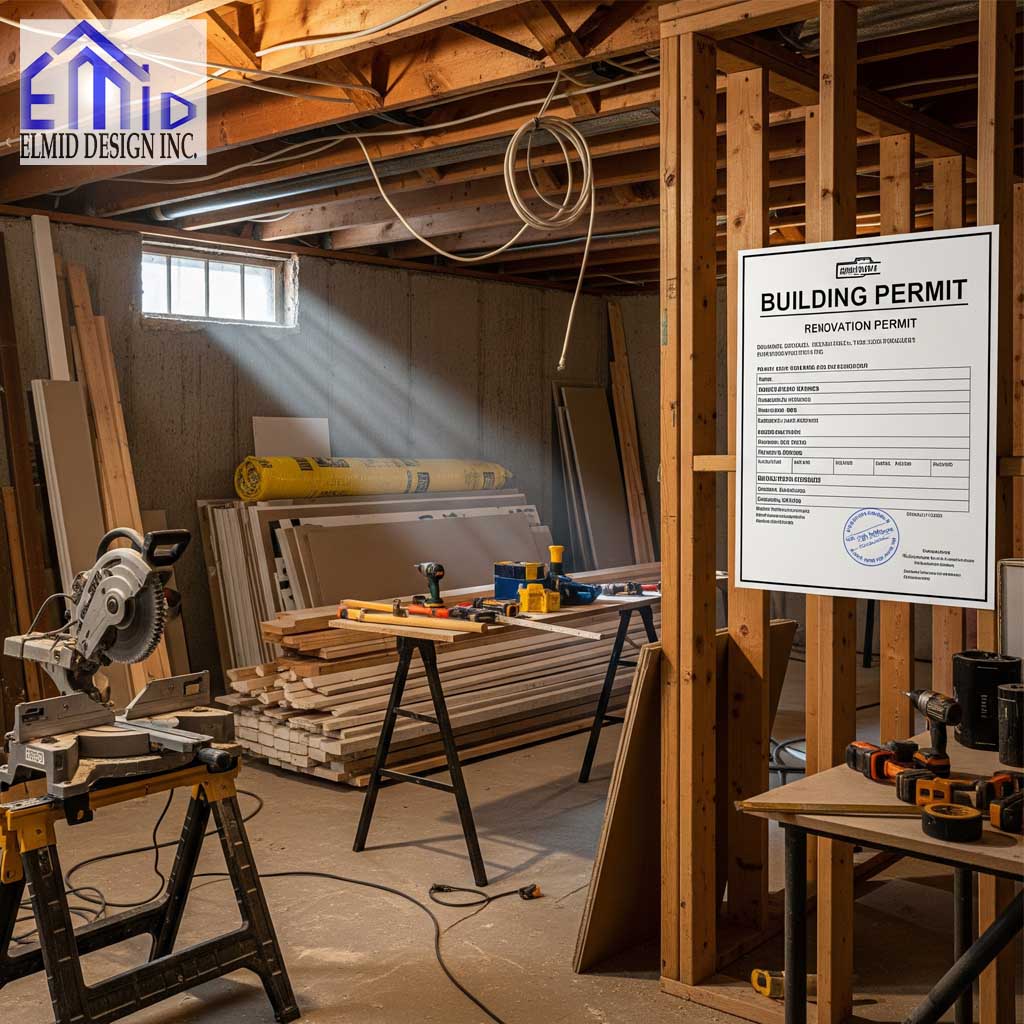Understanding how to secure a permit for basement renovations is essential whether you plan to finish your basement or create a legal secondary suite. The process may feel complex, yet it safeguards structural integrity, boosts resale value, and keeps you compliant with municipal and provincial requirements.
When Do You Need a Permit
You always need a permit if your renovation includes structural changes, plumbing, electrical work, or a new entrance. The Ontario Building Code and City of Toronto bylaws specify that finishing a basement with alterations to walls, plumbing, or electrical systems requires a building permit. If you plan to add a separate entrance or create a legal secondary suite, you also must obtain zoning approval and suite registration.
When a Permit Is Not Required
The City does allow certain cosmetic updates without permits—such as painting, installing flooring, or replacing cabinets—provided you avoid altering structure, plumbing, or electrical systems. However, even seemingly minor modifications might still trigger permit requirements, so always verify with Toronto Building if unsure.
What Happens If You Skip the Permit
Renovating without a permit can lead to serious consequences. You may face stop‑work orders, fines up to tens of thousands of dollars, and even orders to dismantle work that violates code. In addition, insurance claims may be denied and resale transactions may stall when unpermitted work is discovered.
The Permit Application Process in Toronto
You must submit a building permit application to Toronto Building, including detailed architectural plans, structural and engineering drawings where required, and any needed designer or engineer stamps. You can apply online or in person; the city reviews your submission for code compliance. Once approved, the permit must be displayed on site and inspections scheduled throughout construction.
Estimated Costs and Timelines
Permit fees depend on project scope and construction value. In Toronto the minimum residential building permit fee is approximately $198.59, and many renovations cost several hundred to a few thousand dollars. Permit fees are often calculated using a service‑index formula—for example, about $4.93/m² for interior renovations, which means a 500 sq ft basement might cost roughly $230 in permit fees. Allow several weeks for approval on minor projects and up to 2–3 months if zoning variances or complex engineering are involved.
Requirements for Legal Basement Apartment
If you plan to create a legal basement apartment in Toronto, you must follow the Ontario Building Code and municipal zoning. Your unit must be self‑contained, include its own kitchen, bathroom, and sleeping area, and meet requirements for windows, fire separation, ventilation, and heating. You also need approval from the Electrical Safety Authority, proper plumbing and sewer setup, and must obtain both building and occupancy/suite registration permits.
Tips for a Smoother Process
Work with designers, technologists, or engineers who have BCIN certification. That ensures accurate, code‑compliant drawings that meet Toronto’s submission requirements. Prepare full documentation up front to avoid delays. Promptly schedule inspections for framing, plumbing, electrical, and final approval. When in doubt—even about minor work—check with Toronto Building to avoid costly mistakes.

City Review, Inspections, and Approval
Once you submit your permit application, Toronto Building reviews your plans for compliance with the Ontario Building Code, zoning bylaws, and other regulations. The process typically takes between 10 and 15 business days for most renovations, unless the project requires additional variance or engineering review. Following submission, inspections occur at key stages—such as framing, plumbing rough‑in, electrical work, and final finishing—and passing each inspection is essential before you progress. Ultimately, the city issues final approval, confirming your renovation meets the required standards.
Ontario Building Code Compliance
Your basement renovation must meet specific Ontario Building Code requirements such as minimum ceiling height at 1.95 m (6 ft 5 in) and 1.9 m (6 ft 3 in) under beams. Bedrooms require egress windows that open easily and meet minimum opening sizes for emergency escape. Fire safety measures include fire‑rated separation between units, potentially 15‑ or 30‑minute assemblies depending on layout. These standards form the backbone of safety and legal compliance for basement finishing.
Specialized Permits: Electrical, Plumbing, HVAC
Projects involving wiring, plumbing, or HVAC systems require separate permits beyond the general building permit. Electrical upgrades—from new circuits to panel work—must be ESA‑approved and often require certified inspection. Plumbing additions such as new kitchenettes or bathrooms require plumbing permits and proper drainage details. HVAC installations also require dedicated mechanical permits and must align with code guides. These parallel permits ensure each trade meets safety and design standards.
Underpinning and Structural Support
When you need to increase basement ceiling height or install a separate entrance, underpinning or structural modifications become necessary. You must submit cross‑sections, foundation details, designer and engineer stamps, and supporting forms like the Designer Information and Assumption of Responsibility forms. Underpinning deeper foundations involves geotechnical considerations such as the soil’s angle of repose and may trigger professional review requirements.
Rental Licensing and Secondary Suites
If you create a legal basement apartment or secondary suite, you must go through additional steps beyond the building permit. You need to submit a rental renovation license screening form and a secondary suite permit application, including plumbing, mechanical, and building forms. Each new residential unit in the application incurs a per‑unit fee of about $54.16 in Toronto. You also must ensure your design meets Ontario Building Code requirements for separate entrances, fire separation, and self‑contained living units.
Common Mistakes to Avoid
Failing to secure proper permits or misunderstanding the scope can lead to costly problems. Homeowners often overlook requirements for ceiling height, egress, fire separation, or licensed trade inspections. Submitting incomplete plans delays approval, and skipping permits risks fines, denied insurance claims, or forced removal of work. It is safer and more efficient to plan thoroughly and engage qualified professionals early to minimize risk and delays.
Costs, Timelines, and Expert Support
Permit costs in Toronto depend on the type of renovation. The city charges $4.93 per square metre for interior work. If your project includes underpinning, you will pay an extra $11.89 per metre. Each additional unit also adds a separate fee. Complex projects that involve engineering or multiple permits usually take longer. You should expect approval timelines to range from several weeks to two months. When you hire BCIN-certified designers, structural engineers, or architects, you improve compliance, reduce delays, and speed up the entire process.
Technical Design Considerations and Zoning Compliance
A proper basement renovation begins with accurate plans that follow zoning rules in Toronto and the GTA. Zoning by-law 569-2013 defines secondary suites and where they are allowed. Basement apartments are permitted in detached, semi-detached, and townhouse dwellings within approved zones. These suites must not exceed 45 percent of the total floor area. Bungalows are an exception, where the entire basement may qualify. Site-specific conditions may still apply. Your permit drawings must show entrance locations, parking layouts, floor area calculations, and—if needed—approval for front-facing entrances in townhouses.
Egress Window Requirements and Safety Standards
Basement apartments must include egress windows that meet Ontario Building Code standards. The window must have a minimum opening area of 3.8 square feet. No dimension can be smaller than 15 inches. If the window is below ground level, the window well must extend at least 3 feet to allow for safe exit. This setup provides a secondary means of escape during emergencies. Fire separation is also required between units. A 30-minute fire-rated barrier must be installed. Smoke and carbon monoxide detectors must be interconnected across all living areas. Most of the basement’s finished space must have ceiling heights above 6 feet 4 inches to comply with safety codes.
Permit Fees, Timelines, and In‑Depth Cost Estimates
Toronto requires a minimum building permit fee of CAD 206.53. Additional charges apply per square metre based on the service index. Extended inspections or plan reviews cost CAD 89.22 per hour. If your project includes a secondary suite, an extra residential unit fee of CAD 54.16 per unit applies. Renovation timelines vary depending on the complexity of your project and the current city backlog. Simple approvals may take a few weeks, while complex projects may take several months. The total build cost for a legal basement apartment usually ranges from CAD 50,000 to over CAD 120,000. This depends on the level of finishes, system upgrades, and whether a separate entrance is required.
Cost Risks of Non‑Compliance and Corrections
Skipping proper permits or failing to meet standards carries steep consequences. Correcting deficiencies such as egress windows, fire-rated separations, or inadequate plumbing can cost thousands more, for example installations may range from $3000 to $10,000 each; failure to comply may trigger stop‑work orders, fines, legal liability, and denial of insurance or resale complications, so upfront investment in accurate plans and permits pays off in reliability and safety.
Energy Efficiency, Soundproofing, and Long-Term Value
A code‑compliant renovation provides more than legality—it improves energy efficiency, indoor air quality, noise control, and long‑term value. Installing proper insulation, waterproofing, sound‑dampening systems, and efficient mechanical systems delivers comfort, tenant satisfaction, and reduces costs over time.
Choosing the Right Professional Partners
Working with BCIN‑certified designers, structural engineers, architects, or licensed contractors—such as Elmid Design Inc—ensures accurate permit drawings, efficient compliance, code‑safe upgrades, and faster approval. That professional support mitigates risk, improves design quality, and helps manage timelines and inspections confidently.
Full Project Showcase: Legal Basement Apartment Build
A typical legal conversion starts with zoning review, then detailed architectural and structural plans, engineer‑stamped drawings, permit applications for building, plumbing, HVAC, and rental renovation screening. After approval the renovation proceeds, passing inspections at framing, rough‑in, and final stages. Once approved, the apartment becomes legal, rentable, energy‑efficient, safe, and insured. This process reinforces trust, long‑term value, and compliance for homeowners and tenants.
Permit Duration and Renewal
In Toronto, building permits for basement renovations remain valid for six months from the date of approval. If you do not begin work within that time, the permit will expire. To avoid this, you can request an extension from the Chief Building Official. You must provide a valid reason and submit supporting documents that explain the delay in planning or construction.
Expedited Permit Options
Toronto’s FASTRACK permit service provides faster approval for certain minor renovation projects. If your basement renovation involves only interior work and meets zoning rules, approval may take as little as five business days. However, this option applies only to simple projects with no structural changes or external modifications. More complex renovations, including basement apartments or separate entrances, must follow the standard review process. That process usually involves multiple departments and longer timelines for approval.
Real‑World Cost Experiences
Homeowners report that permit and drawing fees for accessory apartments typically range from one thousand five hundred to two thousand five hundred dollars. When including separate entrances, high-end finishes, and new appliances, full renovations can reach up to one hundred ten thousand dollars. These figures highlight the financial importance of careful planning, proper design documentation, and accurate permitting. Investing in professional services early helps control costs and ensures compliance with Toronto’s building regulations.
Economic Value of Legal Suites
Finishing a basement in the GTA typically costs between forty-five thousand and ninety-five thousand dollars per one thousand square feet. This price applies to renovations with basic finishes. For mid- to high-range projects, costs can exceed one hundred thousand dollars depending on design and materials. Legal secondary suites in Toronto can generate monthly rental income between eighteen thousand and thirty thousand dollars per year. This consistent cash flow adds strong long-term financial value for homeowners investing in a legal basement apartment.
Cost Drivers in Renovation Budgeting
Basement renovation costs vary widely based on per square foot rates which range from sixty to over two hundred fifty, with mid‑range full remodels often landing between seventy‑five thousand and one hundred fifty thousand dollars for features like bathrooms, kitchenettes, separate entries, extensive electrical and plumbing work.
Strategic Takeaways for Budget Planning
Investing upfront in accurate permitting, architectural drawings, engineering coordination, and proper building permits protects your project’s legality and eventual return on investment while reducing risk of costly rework, delays, insurance issues or resale complications
FAQs
What kind of basement renovations require a permit in Toronto?
Any basement renovation that involves structural changes, new plumbing or electrical work, changes to load‑bearing walls, adding a new entrance, or creating a legal secondary suite requires a permit in Toronto. This includes underpinning, egress windows, separate HVAC systems, or anything that alters the building envelope or safety systems. If your renovation goes beyond simple cosmetic upgrades, Toronto Building requires you to apply for permits to ensure the work complies with the Ontario Building Code and zoning bylaws.
Can I finish my basement without a permit in the GTA?
You can complete minor cosmetic work like painting, replacing flooring, or installing cabinetry without a permit, as long as you do not alter the structure, plumbing, HVAC, or electrical systems. However, even small changes can sometimes fall under permit requirements if they affect load-bearing walls or egress routes. It’s always safest to check with your local building department in Toronto or the GTA before proceeding without a permit.
How long does it take to get a basement renovation permit in Toronto?
The permit approval timeline depends on the complexity of your project. A simple basement finish with no zoning issues may receive approval in two to four weeks. Projects involving legal secondary suites, underpinning, or structural changes may take six to ten weeks or longer. If you require zoning variances or site plan approvals, the process can take several months. Submitting complete and accurate drawings prepared by certified professionals helps reduce delays during review.
How much does a basement permit cost in Toronto?
The cost of a basement renovation permit varies depending on the size of the space and the type of work involved. The City of Toronto charges a minimum building permit fee of $206.53. For interior renovations, the cost is typically calculated at $4.93 per square metre. Additional fees apply for structural work, underpinning, mechanical permits, and secondary unit registration. Expect to pay several hundred to over one thousand dollars for permits depending on project scope.
What are the penalties for building without a permit?
If you renovate your basement without a required permit, you risk facing stop-work orders, city fines, and legal action. In addition, you may be required to undo completed work, apply retroactively at higher costs, or bring in an engineer to inspect and approve the work after completion. Renovating without permits also invalidates home insurance coverage and complicates real estate transactions. It is more cost-effective and safer to secure proper permits from the start.
Do I need separate permits for electrical and plumbing?
Yes, electrical and plumbing work in Toronto require separate permits and inspections in addition to the general building permit. Electrical work must be performed by a licensed electrician and inspected by the Electrical Safety Authority (ESA). Plumbing changes must meet Toronto’s plumbing code and be reviewed by building inspectors. HVAC modifications may also require mechanical permits. Each system must be approved individually to ensure it meets code and functions safely within the renovated space.
Can I add a kitchen to my basement without permits?
No, adding a kitchen to your basement is considered a change in use and requires a building permit. Kitchens involve plumbing, ventilation, and sometimes gas connections, which fall under health and safety regulations. If the kitchen is part of a plan to create a legal basement apartment or in-law suite, you must also meet requirements for fire separation, egress, and unit registration. Failing to get a permit for a basement kitchen can lead to fines and future complications.

Why Choose Elmid Design Inc for Your Basement Renovation Permit in Toronto
Elmid Design Inc is a trusted engineering firm with a Certificate of Authorization from Professional Engineers Ontario (PEO), specializing in building permit drawings and structural design for basement renovations in Toronto and the GTA. With deep expertise in Ontario Building Code compliance, zoning regulations, and permit application support, Elmid Design Inc ensures your renovation meets all legal and safety standards. Whether you’re planning a finished basement or legal secondary suite, our team streamlines approvals and delivers code-compliant, expert-driven solutions that protect your investment and property value.
Geographic Locations That We Service:
Our Licensed Professional Engineers specializing in Engineered Site Grading Plans offer the best-engineered site grading plan, lot grading and erosion plan, and drainage plan to obtain site plan approval and building permits in Ontario, including a wide range of municipalities. Each area boasts unique features and requirements, making our tailored approach essential for success.
Toronto and Surrounding Areas
In the vibrant heart of Ontario, we service Toronto (City of Toronto) and surrounding areas. Additionally, we cover Oshawa (City of Oshawa), Pickering (City of Pickering), and Clarington (Municipality of Clarington). Furthermore, our expertise extends to Ajax (Town of Ajax), Whitby (Town of Whitby), Brock (Township of Brock), Scugog (Township of Scugog), and Uxbridge (Township of Uxbridge).
Halton Region
Moving to the Halton Region, our services encompass Burlington (City of Burlington) and Halton Hills (Town of Halton Hills). Also included are Milton (Town of Milton) and Oakville (Town of Oakville).
Peel Region
In the Peel Region, we provide services in Brampton (City of Brampton), Mississauga (City of Mississauga), and Caledon (Town of Caledon).
York Region
Our services in the York Region cover Vaughan (City of Vaughan), Aurora (Town of Aurora), and East Gwillimbury (Town of East Gwillimbury). We also cater to Georgina (Town of Georgina), Markham (City of Markham), Newmarket (Town of Newmarket), Richmond Hill (City of Richmond Hill), Whitchurch-Stouffville (Town of Whitchurch-Stouffville), King (Township of King), and Bradford-West Gwillimbury (Town of Bradford-West Gwillimbury). Each municipality here offers a distinct setting, requiring our specialized approach.
Other Southern Ontario Cities and Towns
We also serve many other cities and towns in Southern Ontario. These include Hamilton (City of Hamilton), St. Catharines (City of St. Catharines), Niagara on the Lake (Town of Niagara on the Lake), Brant (County of Brant), Cambridge (City of Cambridge), Kitchener (City of Kitchener), Waterloo (City of Waterloo), and Woodstock (City of Woodstock). Furthermore, we operate in Guelph (City of Guelph), Centre Wellington (Township of Centre Wellington), Shelburne (Town of Shelburne), Orangeville (Town of Orangeville), New Tecumseth (Town of New Tecumseth), Essa (Town of Essa), Collingwood (Town of Collingwood), Wasaga Beach (Town of Wasaga Beach), Barrie (City of Barrie), Midland (Town of Midland), Orillia (City of Orillia), Ramara (Town of Ramara), Minden Hills (Town of Minden Hills), North Kawartha (Town of North Kawartha), Kawartha Lakes (City of Kawartha Lakes), Peterborough (City of Peterborough), Selwyn (Town of Selwyn), and Brighton (Municipality of Brighton).




